-
Programme 1
Cosmism: Immortality for All
The first programme in the series centres on Cosmism, the eclectic mystical-scientific school of thought that surfaced in Russia in the late 19th century and first third of the 20th century, championing the eradication of death and fusing life with the cosmos, as an entity that flows beyond the human. This first block is made up of Yakov Protazanov’s Aelita (1924), a Soviet science-fiction classic, and the Cosmism film trilogy by Anton Vidokle (2015–2017).
-
Friday, 30 April 2021 - 6:30pm / Nouvel Building, Auditorium 400
Session 1
Second session: Monday, 3 May 2021 – 6pm / Sabatini Building, Auditorium
Yákov Protazánov. Aelita
Soviet Union, 1924, b/w, silent, original version with intertitles translated into Spanish, restored digital archive, 90’―Live musical accompaniment by Abel Hernández (El Hijo), José Sánchez-Sanz and Mario Quiñones in the first session
A major success in Soviet cinema and regarded as the first silent science-fiction film, Aelita also puts forward a surprising feminist reading of the Russian Revolution. With a script inspired by the homonymous novel by Cosmist writer Alexei Tolstoy and an elaborate Constructivist set design by artists Aleksandra Ekster and Isaak Rabinovich, the film narrates Martian life as an improved mirroring of activity on earth, specifically Moscow in the years of the New Economic Policy NEP (1922–1928). A Soviet expedition reaches Mars and starts an uprising against the despots that subjugate Aelita, Queen of the Red Planet. The result of this insurrection sets forth a veiled criticism of the Revolution’s authoritarian drifts.

-
Wednesday, 5 May 2021 – 6pm / Sabatini Building, Auditorium
Session 2
Second session: Thursday, 6 May 2021 – 6pm / Sabatini Building, Auditorium
A special screening of Immortality and Resurrection For All in conjunction with International Museum Day: Monday, 17 May 2021 – 6pm / Sabatini Building, Auditorium
Anton Vidokle. This Is Cosmos
Lebanon and Germany, 2015, colour, sound, original version in Russian with Spanish subtitles, digital archive, 28’Anton Vidokle. The Communist Revolution Was Caused By The Sun
Kazakhstan and USA, 2016, colour, sound, original version in Russian with Spanish subtitles, digital archive, 34’Anton Vidokle. Immortality and Resurrection For All
Russia, 2017, colour, sound, original version in Russian with Spanish subtitles, digital archive, 34’―With a video presentation by Anton Vidokle
What if the Soviet Revolution did not look to collectivise property but rather life? And what if the ultimate aim was not to put an end to social classes but death? This trilogy by artist Anton Vidokle sets out a speculative journey through one of the most powerful ideologies on the future: Cosmism. A heterodox Russian ideology straddling the 19th and 20th centuries which postulated immortality; not symbolically, but through the advance of science and humanity’s fusion with the cosmos. In other words, with other lives that are wider than the individual, society and the nation. Founded by philosopher Nikolai F. Fyodorov (1827–1903), Cosmism is the origin of many of the mystical beliefs adopted by art’s avant-garde movements — for instance theosophy — and has ramifications in post-humanist and contemporary naturalist thought.
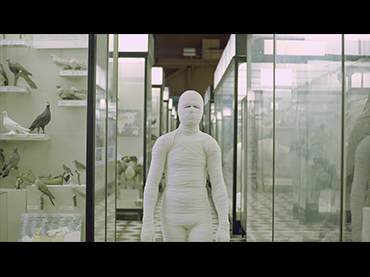
-
Programme 2
The City as an Artefact of the Future
Two classic films that centre on transformations of the city, offering sweeping, counterposing visions of the future. In Metropolis (1926), Fritz Lang develops the city as a total factory in an unhinged modernity; in Paris qui dort (1924), René Clair presents a paused modernity and the city as a huge playground.
-
Friday, 7 May 2021 – 6pm / Sabatini Building, Auditorium
Session 1
Second session: Friday, 14 May 2021 – 6pm / Sabatini Building, Auditorium
Special screening in conjunction with International Museum Day: Sunday, 16 May 2021 – 11:30am / Sabatini Building, Auditorium
Fritz Lang. Metropolis
Germany, 1926, b/w, silent, original version with Spanish intertitles, restored digital archive, 152’A universal film in cinema history that, according to historian Tom Gunning, is articulated around a powerful allegory of the future as the total triumph of the machine. The year is 2026, and the city-state of Metropolis is divided into exploited workers, who work below ground, and the economic and intellectual elite who live in luxury and bask in the gardens above ground. The workers attempt to rebel, but are stopped by Maria, a charismatic figure who speaks to them of love and harmony between classes in an attempt to avoid a violent suppression. The city’s hierarch orders a robot to be created with a likeness to Maria to lead the workers down a path of fruitless rebellion, but her son, committed to the workers, also looks to thwart the plan. Despite this plotline, not free from paternalism, the film conveys one of the most totalitarian recreations of the city as a working machine that governs time, bodies and spaces.

-
Saturday, 8 May 2021 – 6pm / Nouvel Building, Auditorium 400
Session 2
Second session: Thursday, 13 May – 6pm / Sabatini Building, Auditorium
René Clair. Paris qui dort (Paris Asleep)
France, 1925, b/w, silent, original version with Spanish intertitles, restored digital archive, 60’―Live musical accompaniment by Abel Hernández (El Hijo), José Sánchez-Sanz and Mario Quiñones in the first session
―With a presentation by Irene Valle, an art historian and specialist in the relationships between art, city and periphery in the 20th century, in the second session
A guard at the Eiffel Tower looks out over an immobilised Paris. Along with a group of situational travellers, they investigate the cause of such a strange suspension of time. For them, the city transforms into a spontaneous playground in which to experiment with new forms of inhabiting. René Clair thus puts forward a fable in relation to Dadaist and Surrealist ideas around the city, while also formulating a piercing critique of the famous genre of city symphonies — the city as total machine — from the 1920s. Moreover, in passing it offers us a future longing, a recovering of time when everything stops.

-
Programme 3
Capitalist Utopias-Dystopias
These two sessions explore the capitalist promises hailing “a better world” during the long-running Cold War period. In the first session, archivist Rick Prelinger selects a series of orphan films — cinema abandoned by producers or directors and produced by major North American corporations before the pervasiveness of television — which speak of the supposed happiness that surging capitalism was going to offer. Conversely, the second session sees Peter Watkins explore the USA in the counterculture years as an immense concentration camp.
-
Thursday, 20 May 2021 – 6pm / Sabatini Building, Auditorium
Session 1. Capitalist Utopias. Rick Prelinger’s Carte Blanche
Second session: Saturday, 22 May 2021 – 6pm / Sabatini Building, Auditorium
Anonymous. Let’s Go America! America Yesterday, Today and Tomorrow
Produced by Audio Productions for the National Association of Manufacturers
USA, 1936, b/w, sound, original version in English with Spanish subtitles, digital archive, 8’Dr. Everette Peterson. Home Movies: New York City Streets
USA, 1939, colour, silent, digital archive, 2’Dr. Everette Peterson. Home Movies: New York World’s Fair
USA, 1939, colour, silent, digital archive, 2’Anonymous. To New Horizons
Produced by the Jam Handy Organization for General Motors
USA, 1940, colour, sound, original version in English with Spanish subtitles, digital archive, 10’Anonymous. Leave It to Roll-Oh
Produced by the Jam Handy Organization for the Chevrolet Motor Company
USA, 1940, b/w, sound, original version in English with Spanish subtitles, digital archive, 4’Anonymous. Long Distance
Produced by Audio Productions for the Bell System
USA, 1941, b/w, sound, original version in English with Spanish subtitles, digital archive, 4’Anonymous. Give Yourself the Green Light
Produced by the Jam Handy Organization for General Motors Public Relations
USA, 1954, colour, sound, original version in English with Spanish subtitles, digital archive, 5’Anonymous. The Man in the Doorway
Produced by MPO Productions for American Cyanamid
USA, 1957, colour, sound, original version in English with Spanish subtitles, digital archive, 2’Carl Urbano. Destination Earth
Produced by John Sutherland Productions and Film Counselors for the American Petroleum Institute
USA, 1956, colour, sound, original version in English with Spanish subtitles, digital archive, 13’Anonymous. Out of This World
Produced by the Jam Handy Organization for General Motors
USA, 1964, colour, sound, original version in English with Spanish subtitles, digital archive, 5’Lee Madden. 1999 AD
Produced by Tom Thomas Productions for the Philco-Ford Corporation
USA, 1967, colour, sound, original version in English with Spanish subtitles, digital archive, 19’Anonymous. The Your Name Here Story
Produced by Calvin Communications
USA, 1964, colour, sound, original version in English with Spanish subtitles, digital archive, 9’The Prelinger Archive assembles the greatest number of ephemeral and orphan films on the social and cultural life in the United States across the 20th century. Propaganda, education, documentary and amateur films, and audiovisuals on the origins of advertising make up a monumental collective landscape on the history of the American dream. In this session, the archive’s founder, Rick Prelinger, is granted carte blanche to select twelve films that touch on happiness and promises of the future and made between 1939 and 1967, the years before television’s ubiquitousness. These were also years in which corporations went to great lengths to present capitalism and its values as a perfect, conflict-free system.

-
Friday, 21 May 2021 – 6pm / Sabatini Building, Auditorium
Session 2
Second session: Monday, 24 May 2021 – 6pm / Sabatini Building, Auditorium
Peter Watkins. Punishment Park
USA, 1970, colour, sound, original version in English with Spanish subtitles, digital archive, 90’This film explores fascism established within an apparent democracy and is filmed in the documentary style of Peter Watkins — that is, shot in a documentary style but as a piece of fiction. In 1970, the United States is against the ropes in Southeast Asia; the survival of capitalism is in doubt opposite global communism; Nixon decrees a state of emergency and establishes speed trials in which arrested activists are tried by respectable members of the community. Upon completion of these trials, the convicted are offered either a sentence or participation in a sinister game of survival in Punishment Park. A masterly dystopia of alternative histories that would end with one of the actors in prison and Peter Watkins in exile.

-
Programme 4
Afrofuturism
Afrofuturism is a cultural movement that materialised from African diaspora across the second half of the 20th century. By way of a captivating synthesis of science-fiction, technology, magic realism, popular culture and non-Western cosmologies, it raises questions over the place the Black population occupies in history and its situation in the present. The Black citizen, this movement argues, is alien, an other being without rights in this world. This programme comprises four requisite films from Afrofuturist cinema and culminates in a concert which renders an account of the movement’s vitality.
-
Wednesday, 2 June 2021 – 6pm / Sabatini Building, Auditorium
Session 1
Second session: Wednesday, 9 June 2021 – 6pm / Sabatini Building, Auditorium
Lizzie Borden. Born In Flames
USA, 1983, colour, sound, original version in English with Spanish subtitles, restored digital archive, 79’―With a video presentation by Lizzie Borden
A punk, feminist and Afrofuturist dystopia, in which the USA has rejected rampant capitalism and has been re-founded as a “socialist-humanist” Republic. Yet women are still discriminated by the State, which denies equality, by their partners, who oblige them to do housework, and by men, who pester them sexually. A Black woman — for whom discrimination is twofold — decides to set up a militia to protect other women who will rapidly become guerrillas against the State. The film features the participation of numerous artists, among them Gary Hill and Peter Hutton, as camera operators, and John Coplans and Kathryn Bigelow, as actors, and superlative music from The Red Krayola and Art & Language

-
Thursday, 3 June 2021 – 6pm / Sabatini Building, Auditorium
Session 2
Second session: Thursday, 10 June 2021 – 6pm / Sabatini Building, Auditorium
John Coney. Space Is The Place
USA, 1974, colour, sound, original version in English with Spanish subtitles, restored digital archive, 82’. Screenplay by Sun Ra and Joshua SmithCosmic delirium forms the futurist visions of the unparalleled Sun Ra (1914–1993), essayist, poet, pop philosopher and, above all, a virtuoso in a free jazz and experimental psychedelia fusion. Sun Ra, born Herman Sonny Blount, explored how the future of the Black race in the tumultuous and racist 1970s North American society did not flow through integration, but rather through the emancipation of a planet from outer space. With Kabbalistic and hermetic readings and an esoteric fascination with Ancient Egypt, he dreamed that the Black race’s origin and manifest destiny was in outer space — music is the secret technology that will enable inter-planetary travel. In the film, Sun Ra and his Arkestra escape from NASA and harmful Afro-American archetypes, represented by the pimp Overseer, to found a new Black society in the cosmos.

-
Friday, 4 June 2021 – 6pm / Sabatini Building, Auditorium
Session 3
Second session: Friday, 11 June 2021 – 6pm / Sabatini Building, Auditorium
Kibwe Tavares. Robots of Brixton
UK, 2011, colour, sound, original version in English with Spanish subtitles, digital archive, 5’35’’John Akomfrah. The Last Angel of History
UK, 1995, colour, sound, original version in English with Spanish subtitles, restored digital archive, 45’Robots of Brixton is an animation mixing life in a cybernetic megalopolis with the memory of police violence in race riots of the past, is if a yearning for the future could not escape the ghosts of violence. This short film draws inspiration from the historic work of the Black Audio Film Collective, an interdisciplinary British collective in operation between 1982 and 1997. The Last Angel of History is an essay film by John Akromfrah, a member of the aforementioned collective, on future aspirations and imagination through the lyrics, sound technologies and performances of contemporary musicians from African diaspora. The funk of George Clinton and Funkadelic, Sun Ra’s psychedelic jazz, Lee Perry’s dub, and Detroit techno made by Derrick May and Juan Atkins are decoded as forms of imaginary music that contains the seeds of latent futures.

-
Friday, 11 June 2021 – 7pm / Sabatini Building, Garden
Session 4
Siwo concert
Siwo is the alter-ego of Simonal Bie, a producer, vocalist, beat-maker and dancer of Mozambique origin who lives in Barcelona. Considered a pioneer in propelling the Afrobeat scene internationally, Simonal Bie explores his identity as a musician from African diaspora in Siwo, his most personal musical approach. He himself describes his sound as “Afrofuturist electronica with brushstrokes of hip-hop, punk, soul and afrobeat”. This DJ session with a vocal intervention has been put together exclusively for this programme.With the sponsorship of: Estrella Damm
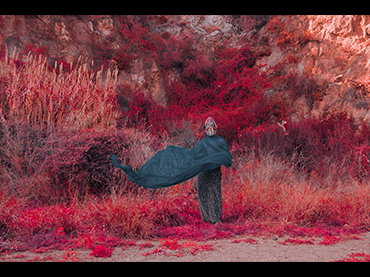
-
Programme 5
Other Lives: Science-Fiction and Conscience
Science-fiction as an existentialist narrative to question the type of life we live, its purpose, and whether the existence of alternative lives is possible through the connection with non-human intelligence. The programme includes the film that defined this paradigm, Andrei Tarkovsky’s Stalker (1979), in addition to In Search of UIQ (2013), by Silvia Maglioni and Graeme Thomson — an endeavour, in a picture that was never made, by philosopher and psychiatrist Félix Guattari — and, finally, A mordida (The Bite), by Pedro Neves Marques, which revolves around a pandemic world, dubbing it as “the dictatorship of biotechnology”.
-
Wednesday, 16 June 2021 – 6pm / Sabatini Building, Auditorium
Session 1
Second session: Wednesday, 23 June 2021 – 6pm / Sabatini Building, Auditorium
Andrei Tarkovsky. Stalker
Soviet Union, 1979, colour, sound, original version in Russian with Spanish subtitles, digital archive, 155’Stalker stands at a temporal crossroads. On one side, it incorporates the experiences of the gulag and concentration camp that extend across the history of the 20th century. And on the other, a foreboding advance of the Chernobyl disaster, which would occur just a few years after the film was first shown. Set in a distant future, a writer and scientist from a devastated society, akin to the USSR in its final years, join a guide — the Stalker — to go deeper into the “Zone”, a space between unspoilt nature and the traces of other non-human lives, alien to any physical law, with a heavily militarised perimeter. In the Zone there is a room which grants a person’s innermost desires, but which can, however, lead to the destruction of the individual who ignores that which he truly desires.
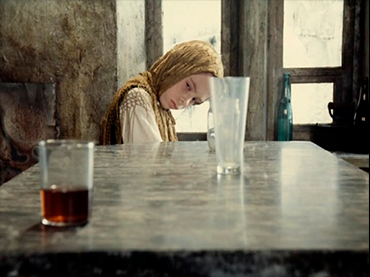
-
Thursday, 17 June 2021 – 6pm / Sabatini Building, Auditorium
Session 2
Second session: Thursday, 24 June 2021 – 6pm / Sabatini Building, Auditorium
Silvia Maglioni and Graeme Thomson. In Search of UIQ
France, 2013, colour, sound, original version in French with Spanish subtitles, digital archive, 72’
With a video presentation by Silvia Maglioni and Graeme ThomsonA striking example of a film as a succession of potential events, In Search of UIQ travels through different rooms in the surprising relationship psychiatrist and philosopher Félix Guattari (1930–1992) had with cinema. Guattari, who conceived of film as a potent machine of subjectivation, would complete the script to a science-fiction film and, with Robert Kramer as director, would fruitlessly attempt to take it to cinemas. The project reflects Tarkovsky’s influence in the existential approach to the genre, yet it also leads into new territories, setting out from the infinitesimal, the infraquarks, as other and imperceptible life forms that exist in our own space. One of these infraquarks, UIQ, is installed in a scientist’s body as a viral being that cannot see but still inhabits and transforms him.
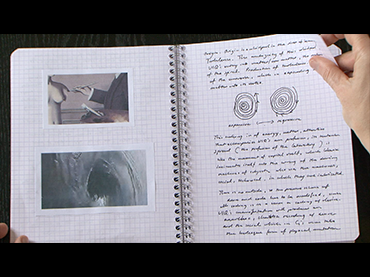
-
Friday, 18 June 2021 – 6pm / Sabatini Building, Auditorium
Session 3
Second session: Friday, 25 June 2021- 6pm / Sabatini Building, Auditorium
Pedro Neves Marques. A mordida (The Bite)
Portugal and Brazil, 2019, colour, sound, original version in Portuguese with Spanish subtitles, digital archive, 26’Pedro Neves Marques. Semente exterminadora (Exterminating Seed)
Portugal and Brazil, 2017, colour, sound, original version in Portuguese with Spanish subtitles, digital archive, 28’The fiction films of artist Pedro Neves Marques explore the catastrophic effects of our way of life on an intimate and subjective scale. Set in an uncannily close and familiar future, they set forth a world dominated by genetic engineering, extractivism and transgenic monoculture, in contrast to his films’ leading characters, whose identities resist binary norms. In The Bite, a laboratory investigates how to genetically slow down an epidemic transmitted by mosquitos, while three people take refuge in polyamory. In Exterminating Seed, an android, YWY, becomes aware of its infertility in a landscape between soya monoculture plants and oil rigs.

-
Wednesday, 30 June – 6pm / Sabatini Building, Auditorium
Epilogue. A Comedy on Love, Machines and Automation
Second session: Friday, 2 July 2021 – 6pm / Sabatini Building, Auditorium
The series is brought to a close with an underground American comedy on work automation and desiring machines.
Mike Kuchar. Sins of the Fleshapoids
USA, 1965, colour, sound, original version in English with Spanish subtitles, restored digital archive, 43’A million years in the future. After a nuclear world war, half of humanity has been wiped out. There are no longer conflicts or weapons, and the humans that remain live in indulgence and extreme easy-living and are served by machines, robots of synthetic flesh that replicate humans — hence the name fleshapoids — but cannot have feelings. Sick and tired of servitude, the machines start a revolution based on learning about desire and love. This melodramatic comedy on desiring machines is widely viewed as a masterpiece of the 1960s North American underground and was hugely influential for artists such as Andy Warhol and film-makers like John Waters.
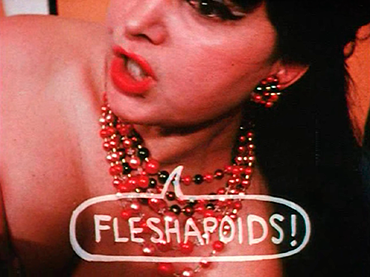
![Pedro Neves Marques, Semente exterminadora [Exterminating Seed], film, 2017](https://recursos.museoreinasofia.es/styles/large_landscape/public/Actividades/futuros_posibles_snippet.jpg.webp)
Held on 30 Apr 2021
This audiovisual series pivots on cinema’s future imagining with films made between 1920 and 2020, an historical expanse of one hundred years in which the future is manifested as an idea at odds with progress conceived as dogma, as a radical critique of the present, and as a yearning for new worlds. What are the imagined futures in the past and which future is projected and desired in our present?
One idea was repeated over and over again in the 1990s: the future does not exist. The global expansion of laissez-faire capitalism seemed to appropriate punk’s landmark slogan “No Future” to narcotically herald a present continuous. The future was systematically denied as much by the defenders of the system and as its fiercest critics, who tore into it, illustrating it being part of ephemeral and irrelevant consumerism. Ultimately, as the cultural critic Mark Fisher reminds us in his book Capitalist Realism (Zero Books, 2009), “it’s easier to imagine the end of the world than the end of capitalism”. In view of this belief, another opposing idea made headway in the years that elapsed between the 2008 financial crisis and the health crisis which started in 2020: the need to reclaim a horizon. The right to long for a future of which we had been dispossessed and which, in terms of expectation, concentrates a powerful desire for change and a desire to conceive of other worlds, now both possible and close. Thus, the reflection on the future has become a potent toolbox with a double meaning: on one side, it groups an imagining of the future in past tenses, in those “retro-futures” that brought us closer to unrealised utopian moments in history; and on the other, the idea of future today converges innovate speculative and fictitious uses which occupy myriad artists born at the turn of the new millennium as it looks to saturate the present with multiple narratives of would-be times. This disjunctive between past futures and latent futures gives shape to this audiovisual programme.
The series is structured around five thematic programmes and an epilogue, with two sessions in each. It assembles films from different orbits such as silent film, the underground, orphan films and archive films, auteur film and more recent films made by artists, all under the sole premise that they belong to a cinema of equality, free from hierarchies. Moreover, they fall under this umbrella not just because they belong to the same medium, but because of their capacity to represent — in images and accounts — the desires of the collective sub-conscious, preceding history and giving form to the common yearning for a new time, an intrinsic part of film as art from its inception.
Comisariado
Chema González
Más actividades

Difficulty. Forms and Political Effects of Deviation in Writing and Contemporary Art
23 February – 14 December 2026 – Check programme
Difficulty. Forms and Political Effects of Deviation in Writing and Contemporary Art is a study group aligned towards thinking about how certain contemporary artistic and cultural practices resist the referentiality that dominates the logics of production and the consumption of present-day art. At the centre of this proposal are the concepts of difficulty and deviation, under which it brings together any procedure capable of preventing artistic forms from being absorbed by a meaning that appears previous to and independent from its expression. By ensuring the perceptibility of their languages, difficulty invites us to think of meaning as the effect of a signifying tension; that is, as a productive and creative activity which, from the materiality of art objects, frees aesthetic experience from the representational mandate and those who participate in it from the passiveness associated with tasks of mimesis and decoding.
The economy of the referential norm translates the social logic of capitalism, where insidious forms of capturing subjectivity and meaning operate. In the early 1980s, and adopting a Marxist framework, poet Ron Silliman highlighted how this logic entailed separating language from any mark, gesture, script, form or syntax that might link it to the conditions of its production, rendering it fetichised (as if without a subject) and alienating its users in a use for which they are not responsible. This double dispossession encodes the political strategy of referential objectivity: with no subject and no trace of its own consistency, language is merely an object, that reality in which it disappears.
The political uses of referentiality, more sophisticated today than ever before, sustain the neoliberal-extractivist phase of capitalism that crosses through present-day societies politically, economically and aesthetically. Against them, fugitive artistic practices emerge which, drawing from Black and Queer studies and other subaltern critical positions, reject the objective limits of what exists, invent forms to name what lies outside what has already been named, and return to subjects the capacity to participate in processes of emission and interpretation.
Read from the standpoint of artistic work, the objective capture of referentiality may be called transparency. Viewed from a social contract that reproduces inequality in fixed identity positions, transparent in this objectivity are, precisely, the discourses that maintain the status quo of domination. Opposite the inferno of these discourses, this group aims to collectively explore, through deviant or fugitive works, the paradise of language that Monique Wittig encountered in the estranged practices of literature. For the political potency of difficulty — that is, its contribution to the utopia of a free language among equals — depends on making visible, first, its own deviations; from there, the norm that those deviations transgress; and finally, the narrowness of a norm which in no way exhausts the possibilities ofsaying, signifying, referring and producing a world.
From this denouncement of referential alienation, fetishisation and capture, Difficulty. Forms and Political Effects of Deviation in Writing and Contemporary Art turns its attention to the strategies of resistance deployed by contemporary artists and poets. Its interest is directed towards proposals as evidently difficult or evasive as those of Gertrude Stein, Lyn Hejinian, Theresa Hak Kyung Cha, Kameelah Janan Rasheed, Kathy Acker, María Salgado and Ricardo Carreira, and as seemingly simple as those of Fernanda Laguna, Felix Gonzalez Torres and Cecilia Vicuña, among other examples that can be added according to the desires and dynamics of the group.
The ten study group sessions, held between February and December, combine theoretical seminars, work with artworks from the Museo Reina Sofía’s Collections and exhibitions, reading workshops and public programs. All these formats serve as spaces of encounter to think commonly about certain problems of poetics — that is, certain political questions — of contemporary writing and art.
Difficulty. Forms and Political Effects of Deviation in Writing and Contemporary Art inaugurates the research line Goodbye, Representation, through which the Museo Reina Sofía’s Studies Directorship seeks to explore the emergence of contemporary artistic and cultural practices which move away from representation as a dominant aesthetic-political strategy and redirect their attention toward artistic languages that question the tendency to point, name and fix, advocating instead for fugitive aesthetics. Over its three-year duration, this research line materializes in study groups, seminars, screenings and other forms of public programming.

Institutional Decentralisation
Thursday, 21 May 2026 – 5:30pm
This series is organised by equipoMotor, a group of teenagers, young people and older people who have participated in the Museo Reina Sofía’s previous community education projects, and is structured around four themed blocks that pivot on the monstrous.
This fourth and final session centres on films that take the museum away from its axis and make it gaze from the edges. Pieces that work with that which is normally left out: peripheral territories, unpolished aesthetics, clumsy gestures full of intent. Instead of possessing an institutional lustre, here they are rough, precarious and strange in appearance, legitimate forms of making and showing culture. The idea is to think about what happens when central authority is displaced, when the ugly and the uncomfortable are not hidden, when they are recognised as part of the commons. Film that does not seek to be to one’s liking, but to open space and allow other ways of seeing and inhabiting the museum to enter stage.

Intergenerationality
Thursday, 9 April 2026 – 5:30pm
This series is organised by equipoMotor, a group of teenagers, young people and older people who have participated in the Museo Reina Sofía’s previous community education projects, and is structured around four themed blocks that pivot on the monstrous.
The third session gazes at film as a place from which to dismantle the idea of one sole history and one sole time. From a decolonial and queer perspective, it explores films which break the straight line of past-present-future, which mix memories, slow progress and leave space for rhythms which customarily make no room for official accounts. Here the images open cracks through which bodies, voices and affects appear, disrupting archive and questioning who narrates, and from where and for whom. The proposal is at once simple and ambitious: use film to imagine other modes of remembering, belonging and projecting futures we have not yet been able to live.

Remedios Zafra
Thursday March 19, 2026 - 19:00 h
The José Luis Brea Chair, dedicated to reflecting on the image and the epistemology of visuality in contemporary culture, opens its program with an inaugural lecture by essayist and thinker Remedios Zafra.
“That the contemporary antifeminist upsurge is constructed as an anti-intellectual drive is no coincidence; the two feed into one another. To advance a reactionary discourse that defends inequality, it is necessary to challenge gender studies and gender-equality policies, but also to devalue the very foundations of knowledge in which these have been most intensely developed over recent decades—while also undermining their institutional support: universities, art and research centers, and academic culture.
Feminism has been deeply linked to the affirmation of the most committed humanist thought. Periods of enlightenment and moments of transition toward more just social forms—sustained by education—have been when feminist demands have emerged most strongly. Awareness and achievements in equality increase when education plays a leading social role; thus, devaluing intellectual work also contributes to harming feminism, and vice versa, insofar as the bond between knowledge and feminism is not only conceptual and historical, but also intimate and political.
Today, antifeminism is used globally as the symbolic adhesive of far-right movements, in parallel with the devaluation of forms of knowledge emerging from the university and from science—mistreated by hoaxes and disinformation on social networks and through the spectacularization of life mediated by screens. These are consequences bound up with the primacy of a scopic value that for some time has been denigrating thought and positioning what is most seen as what is most valuable within the normalized mediation of technology. This inertia coexists with techno-libertarian proclamations that reactivate a patriarchy that uses the resentment of many men as a seductive and cohesive force to preserve and inflame privileges in the new world as techno-scenario.
This lecture will address this epochal context, delving into the synchronicity of these upsurges through an additional parallel between forms of patriarchal domination and techno-labor domination. A parallel in which feminism and intellectual work are both being harmed, while also sending signals that in both lie emancipatory responses to today’s reactionary turns and the neutralization of critique. This consonance would also speak to how the perverse patriarchal basis that turns women into sustainers of their own subordination finds its equivalent in the encouraged self-exploitation of cultural workers; in the legitimation of affective capital and symbolic capital as sufficient forms of payment; in the blurring of boundaries between life and work and in domestic isolation; or in the pressure to please and comply as an extended patriarchal form—today linked to the feigned enthusiasm of precarious workers, but also to technological adulation. In response to possible resistance and intellectual action, patriarchy has associated feminists with a future foretold as unhappy for them, equating “thought and consciousness” with unhappiness—where these have in fact been (and continue to be) levers of autonomy and emancipation.”
— Remedios Zafra

27th Contemporary Art Conservation Conference
Wednesday, 4, and Thursday, 5 March 2026
The 27th Contemporary Art Conservation Conference, organised by the Museo Reina Sofía’s Department of Conservation and Restoration, with the sponsorship of the Mapfre Foundation, is held on 4 and 5 March 2026. This international encounter sets out to share and debate experience and research, open new channels of study and reflect on conservation and the professional practice of restorers.
This edition will be held with in-person and online attendance formats, occurring simultaneously, via twenty-minute interventions followed by a five-minute Q&A.